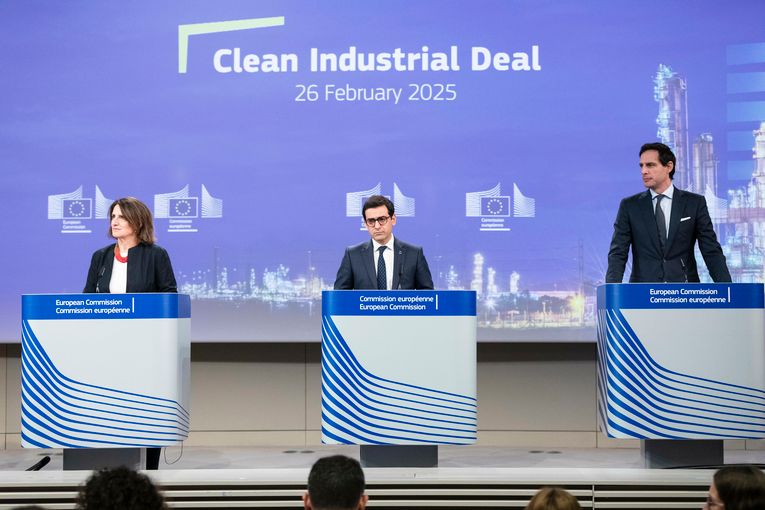
The European Commission has launched its Clean Industrial Deal, which aims to deliver €100 billion (US$105 billion) for clean energy manufacturing in Europe, and includes a specific “made in Europe” criterion for project procurement.
The deal will look to support clean energy manufacturing on the continent, with Europe “faced with high energy costs and fierce global competition”; within the solar sector, this takes the form of Chinese-made modules, which can be produced for almost €0.2/watt less than European ones, according to Wood Mackenzie.
Try Premium for just $1
- Full premium access for the first month at only $1
- Converts to an annual rate after 30 days unless cancelled
- Cancel anytime during the trial period
Premium Benefits
- Expert industry analysis and interviews
- Digital access to PV Tech Power journal
- Exclusive event discounts
Or get the full Premium subscription right away
Or continue reading this article for free
The deal’s action points include the implementation of a ‘Clean Industrial Deal State Aid Framework’ to help the rollout of state aid for renewable energy manufacturing projects, and the strengthening of the EU Innovation Fund with a new ‘Industrial Decarbonisation Bank’ that will make €100 billion in financing available for such projects. The presumed growth of the European clean energy manufacturing sector off the back of the deal is expected to add half a million new jobs, and see its value more than triple to €100 billion by the end of the decade.
Crucially, the deal will include a specific “made in Europe” criterion that European developers can apply for, for consideration in public and private procurements. Earlier this week, the European Solar Manufacturing Council (ESMC) called for the European Commission to include such a clause in the Net Zero Industry Act (NZIA) to protect European manufacturers from “extreme pressure from unfair Chinese competition” following the leak of a draft of the deal.
While details are yet to be clarified on how this criterion will be assessed, or how it will benefit manufacturers looking to secure supply contracts, a specific incentive to deploy European-made products could be a positive development for European manufacturers.
‘A key pillar for industrial competitiveness’
“The Clean Industrial Deal brilliantly sets electrification as a key pillar for industrial competitiveness and decarbonisation, including a new 32% electrification target by 2030,” said Walburga Hemetsberger, CEO of trade body SolarPower Europe. “We see that as a floor, not a ceiling.”
“However, dedicated financial support for electrification needs to materialise,” Hemetsberger continued, suggesting that the bill does not do enough to eliminate fossil fuels from the European energy mix. “The new Industrial Decarbonisation Bank risks pitching electrification against gas-dependent solutions that look good on paper but miss the irrefutable benefits of electrification.”
Other provisions include the establishment of a mechanism to enable European companies to “aggregate their demand for critical raw minerals”, and moves towards the adoption of a ‘Circular Economy Act’ in 2026 to ensure more minerals are re-used across the supply chain. The European Commission aims for 24% of the minerals in European industry to be “circular” by 2030, and follows calls from investors and developers across the global solar sector to improve the transparency and the circularity of the global solar supply chain.
The new deal will also establish a ‘Union of Skills’ to improve the training and education of vital renewable energy manufacturing workers, and follows comments made by Andrew Eldred, chief operating officer of the Electrical Contractors’ Association, who told PV Tech Premium that a lack of standardisation has hamstrung efforts to improve training in the solar industry, as “the solar sector hasn’t properly defined the occupation [of installer].”






